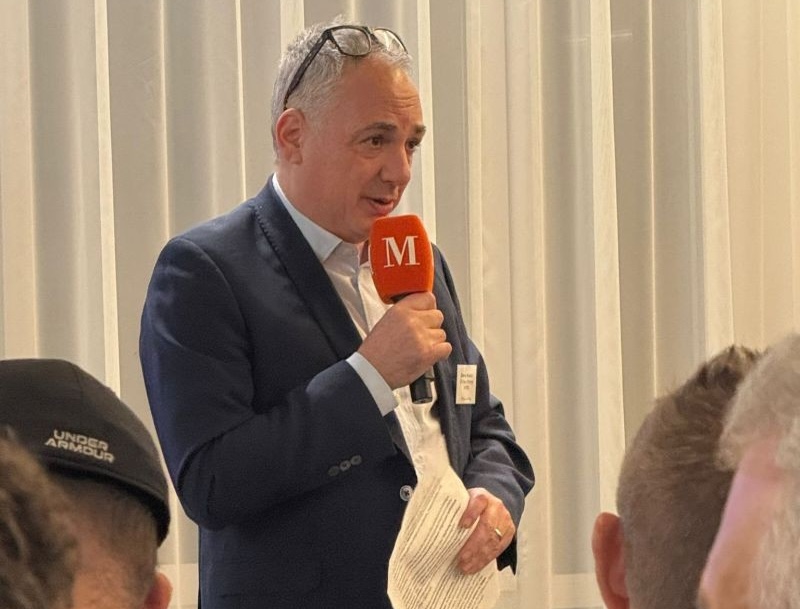Visions for Israel's tomorrow; Insights on tech, investment & Israeli society

In a packed meeting room at the offices of Mishcon de Reya LLP (MDR) in London, key business leaders, investors, and entrepreneurs gathered to discuss the future of Israel’s tech ecosystem and its global significance. Mishcon de Reya, known for supporting Jewish causes globally and fighting anti-semitism on a local government level here in the UK, provided the perfect setting to cohost this event with UKIB - The Bilateral Chamber of Commerce Beyond its legal work, MDR’s engagement with Israeli tech and life sciences reflects a deep-rooted commitment to fostering innovation and international collaboration.
At the heart of the event was an inspiring interview with Michael Eisenberg, a serial entrepreneur and co-founder of Aleph VC, who shared compelling insights into Israel’s resilience, adaptability, and its promising road ahead for tech investment. As the conversation, moderated by MDR Managing Partner James Libson, unfolded, several key takeaways;
Despite facing considerable challenges—particularly after the events of October 7th—Israel’s tech sector remains remarkably resilient. Michael Eisenberg highlighted the astonishing performance of the ecosystem, with Aleph VC alone committing nearly $100 million to Israeli startups this year. On a broader scale, Israel recorded $10.5 billion in mergers and acquisitions (M&A) in 2024, a testament to its strength even amidst a global economic slowdown.
Progress is driven by people, not institutions. One of Michael’s most powerful points was that Israel’s resilience stems from its citizens. He pointed to the example of the Israel Defense Forces (IDF) quickly mobilising extra beds for volunteers, demonstrating the nation’s unparalleled sense of duty and community. "Israel has the greatest citizens in the world," he remarked, highlighting the power of individuals to drive progress in the face of adversity.
A call for fresh blood in Israel’s political system. Israel’s political landscape could benefit from an influx of young talent. While its tech ecosystem thrives on innovation and youthful energy, its political system must also reflect this dynamism to address emerging challenges effectively.
Israel’s debt-to-GDP ratio: With relatively low debt-to-GDP levels, Israel has long enjoyed a stable economic foundation. However, Michael cautioned that rising interest payments on debt could become a long-term issue if not carefully managed. Policymakers must remain vigilant to ensure that economic growth isn’t offset by unsustainable borrowing costs.
Tech talent is in high demand. Israel’s reputation as a tech powerhouse is well-earned, boasting more engineers and scientists per capita than any other country. However, even with this wealth of talent, demand is outpacing supply. For Israel to sustain its innovation-driven growth, attracting and retaining global talent will be key. More initiatives encouraging immigration and workforce development could help bridge the gap.
A post-October 7th world will shape new innovation. While the tragic events of October 7th have left an indelible mark on the nation, Michael noted that Israel’s innovative spirit remains intact. From cybersecurity to healthcare, Israeli entrepreneurs have long developed solutions to global problems, and this period of hardship will likely spark a new wave of innovations.
One of the event’s recurring themes was the opportunity for London to solidify its position as a global Fintech capital. With many entrepreneurs and investors now looking beyond London’s borders, now is the time to foster closer ties between London's expertise in investment and financial services, and the Innovation nation. By offering financial services and creating a supportive environment, London could attract even more Israeli scaleups.
The Abraham Accords have unlocked new economic opportunities for Israel by normalising ties with key Middle Eastern countries like the UAE, Bahrain, and Morocco. These agreements have spurred trade growth, joint ventures in sectors like energy and cybersecurity, and access to new markets across Asia and Africa. With trade between Israel and the UAE surging tenfold in just two years, Israeli startups are expanding their reach, positioning the country as a hub for regional innovation and investment.

Danny Kessler serial investor and Chairman of UKIB UK Israel Business, encapsulated..
"Together, we will continue to innovate, collaborate, and build a future of resilience and opportunity for both the UK and Israel—and beyond." Danny Kessler
Looking Ahead: Seizing the Opportunity
For me the event was more than a discussion where a seasoned entrepreneur shared his contagious optimism; it was an educational piece on why now is the time for investors to take action. With Israeli innovation at an all-time high and the UK actively seeking stronger ties with its startups and scale-ups, now is the time for investors to engage. The challenges facing Israel will undoubtedly shape its future innovations, but as history has shown, the country thrives under pressure.
For those looking to invest in emerging markets, 2025 is shaping up to be a pivotal year for Israeli tech. As Aleph VC’s continued commitment shows, despite the global slowdown, Israel’s unique ecosystem of resilience, talent, and innovation is still a strong bet for long-term growth.

Jon Simmons is a bi-lateral trade investment advocate for Israel and its supporters, and content strategist for ambitious businesses looking to grow online.
You might also like to read this:

















